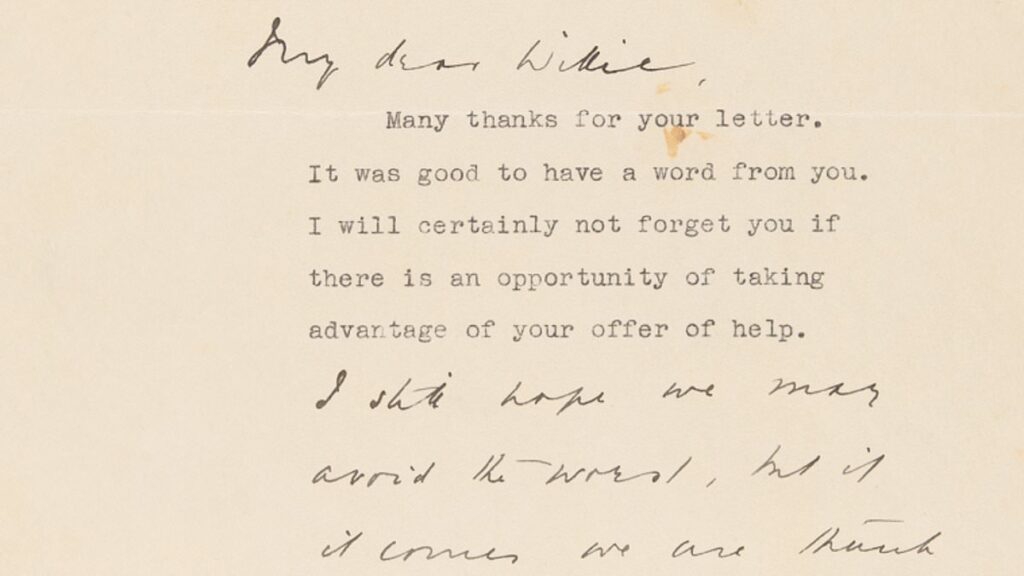A candid letter by Neville Chamberlain saying ‘I still hope we may avoid the worst’ six days before the start of the Second World War has emerged.
The beleaguered British prime minister pursued an appeasement policy with Nazi Germany in a bid to prevent an escalation into a global conflict.
After signing the derided Munich Agreement with Adolf Hitler in September 1938, he infamously declared that it was ‘peace in our time’.
Now a newly discovered letter shows how he clung on to the hope that his strategy would pay off right up until Germany invaded Poland on September 1, 1939.
Writing to Conservative MP Captain William Brass on August 26, 1939, he stated: ‘I still hope we may avoid the worst, but if it comes we are thank God prepared for it.’
However, within nine months the Nazis had captured large swathes of Europe.
More than 330,000 British Expeditionary Force troops were hastily evacuated at Dunkirk to enable Britain to ‘fight another day’.
A candid letter by Neville Chamberlain saying ‘I still hope we may avoid the worst’ six days before the start of the Second World War has emerged
Chamberlain making his ‘peace in our time’ address at Heston Airport after returning from signing the Munich Agreement, 1938
Chamberlain lost the confidence of Parliament and resigned as Prime Minister in May 1940, with Winston Churchill stepping up to lead the nation.
The one-page letter, on 10 Downing Street letterhead and dated August 26, 1939, has emerged for sale at RR Auction, of Boston, US.
It is tipped to fetch £15,000 ($20,000) due to its historical significance.
An RR Auction spokesperson said: ‘On August 26, 1939, Great Britain stood on the precipice of war, with tensions between Germany and Poland escalating to a breaking point.
‘For months, Europe had watched Adolf Hitler’s aggressive expansion with growing alarm.
‘Britain, having learned hard lessons from appeasement, had made a guarantee to come to Poland’s aid if its independence was threatened, solidified in the Anglo-Polish military alliance signed one day earlier on August 25.
Adolf Hitler greets British Prime Minister Neville Chamberlain at Munich in September 1938. Chamberlain hoped that striking a deal with Hitler would avoid war
Chamberlain was replaced as PM by Winston Churchill, who had fiercely criticised his policy of Appeasement. Above: The pair (Chamberlain right) together at a medal ceremony, 1939
German forces invaded Poland on September 1, 1939, leading Britain and France to declare war on Germany
‘Hitler had originally scheduled his invasion of Poland for August 26, but when news of the Anglo-Polish pact reached Berlin, he temporarily postponed the attack.
‘Behind the scenes, British diplomats were still scrambling to avert war.
‘Chamberlain hoped that deterrence, through strong alliances and military mobilisation, might still dissuade Hitler.
‘At the same time, Britain was accelerating preparations – air raid precautions were being implemented across cities, reservists were being called up, and public morale was being steeled for the possibility of conflict.
‘Thus Britain found itself in a state of grim resolve: committed to defending Poland, preparing for war, yet still clinging to fragile hopes that Hitler might yet be deterred.
‘Within a week, however, those hopes would be extinguished as Germany launched its invasion of Poland on September 1.’
The sale takes place on Wednesday.
